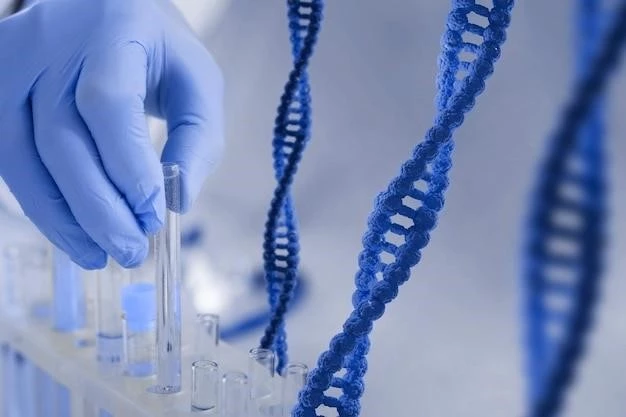Glycogen Storage Disease
Disease⁚ Glycogen storage disease. In this article, we will explore the genetic and metabolic aspects of the disorder, its symptoms, diagnosis, different types, and the impact it has on liver and muscle functioning. We will also delve into glycogenolysis, treatment options, genetic counseling, daily life implications, hypoglycemia, and ongoing research.
Introduction
Glycogen storage disease is a rare metabolic disorder caused by genetic defects that impair the body’s ability to break down glycogen, leading to its abnormal accumulation in tissues. This buildup primarily affects the liver and muscles, disrupting crucial metabolic processes. Individuals with this disease may experience symptoms like hypoglycemia, muscle weakness, and enlarged liver. The diagnosis involves genetic testing and enzyme analysis. Treatment focuses on managing symptoms, maintaining blood glucose levels, and dietary modifications. Genetic counseling plays a vital role in understanding the inheritance pattern and potential risks for future generations. The impact of glycogen storage disease on daily life can be significant, requiring a careful balance of nutrition, medication, and regular monitoring. Complications such as respiratory issues, cardiac problems, and severe hypoglycemia can arise, highlighting the complex nature of the disorder. Ongoing research aims to enhance treatment strategies, improve diagnostic methods, and ultimately find a cure for this challenging condition.
Genetics and Metabolism
Glycogen storage disease is primarily caused by mutations in genes responsible for enzymes involved in glycogen metabolism. These genetic defects disrupt the normal breakdown of glycogen into glucose, impacting energy production. The inheritance pattern varies depending on the specific type of glycogen storage disease, with some forms being inherited in an autosomal recessive manner, while others follow an autosomal dominant pattern. Metabolically, the inability to properly metabolize glycogen leads to glycogen accumulation in tissues, particularly in the liver and muscles. This disrupts normal cellular functions and can result in a range of symptoms affecting various organs and systems in the body. Understanding the genetic basis and metabolic processes underlying glycogen storage disease is crucial for accurate diagnosis, effective management, and ongoing research into potential treatment options.
Symptoms and Diagnosis
The symptoms of glycogen storage disease can vary depending on the specific type and severity of the condition. Common symptoms include hypoglycemia, muscle weakness, fatigue, enlarged liver, and growth delays in children. These manifestations result from the impaired metabolism of glycogen, leading to energy deficiency in cells; Diagnosing glycogen storage disease typically involves a combination of genetic testing, enzyme analysis, imaging studies, and clinical evaluation. Genetic testing can identify specific gene mutations responsible for the disorder, while enzyme analysis helps assess the activity of key enzymes involved in glycogen metabolism. Imaging studies may reveal abnormal deposits of glycogen in tissues like the liver. Clinical evaluation includes assessing symptoms, medical history, and physical examination to confirm the diagnosis and determine the type of glycogen storage disease affecting an individual.
Types of Glycogen Storage Disease
There are several types of glycogen storage disease, each caused by mutations in different genes encoding enzymes involved in glycogen metabolism. These variations lead to distinct clinical presentations and severity of symptoms. Some common types include Glycogen Storage Disease Type I (also known as Von Gierke disease), Type II (Pompe disease), Type III (Cori disease), Type IV (Andersen disease), and Type V (McArdle disease). Each type has specific enzyme deficiencies affecting glycogen breakdown in different tissues, resulting in a range of symptoms such as hypoglycemia, muscle weakness, hepatomegaly, and cardiomyopathy. Understanding the specific type of glycogen storage disease is essential for tailored treatment approaches and management strategies to address the unique challenges faced by individuals with these genetic disorders.
Liver and Muscle Involvement
Glycogen storage disease predominantly affects the liver and muscles due to the accumulation of glycogen in these tissues. In the liver, glycogen buildup can lead to hepatomegaly (enlarged liver) and impair liver function, resulting in abnormal blood sugar levels and metabolic disturbances. Muscle involvement manifests as muscle weakness, cramping, and myopathy due to disrupted energy production and muscle function. Individuals with glycogen storage disease may experience exercise intolerance and fatigue due to compromised muscle metabolism. The impact on liver and muscle tissues underscores the systemic nature of this disorder and the importance of managing both liver and muscle-related symptoms to improve overall quality of life for affected individuals.
Metabolic Pathways⁚ Glycogenolysis and Gluconeogenesis
Glycogen storage disease disrupts essential metabolic pathways like glycogenolysis and gluconeogenesis. Glycogenolysis is the breakdown of glycogen into glucose, providing a critical energy source during times of fasting or increased energy demands. In individuals with glycogen storage disease, this process is impaired, leading to decreased glucose availability and subsequent hypoglycemia. Gluconeogenesis, the synthesis of glucose from non-carbohydrate sources, plays a vital role in maintaining blood glucose levels. However, disruptions in this pathway due to glycogen metabolism defects can further contribute to hypoglycemia and metabolic imbalances. Understanding the intricate interplay between glycogenolysis, gluconeogenesis, and glycogen storage is essential for elucidating the pathophysiology of glycogen storage disease and developing targeted therapeutic interventions to restore metabolic balance and alleviate symptoms associated with this complex disorder.
Treatment Options
The management of glycogen storage disease focuses on alleviating symptoms, maintaining metabolic balance, and improving quality of life. Treatment strategies may include dietary modifications such as consuming frequent meals rich in complex carbohydrates to prevent hypoglycemia and provide sustained energy. Some individuals may require continuous glucose infusion or overnight feeding to prevent dangerous drops in blood sugar levels. Enzyme replacement therapy or gene therapy approaches are being explored to address specific enzyme deficiencies in glycogen metabolism. Regular monitoring of blood glucose levels, liver function, and muscle health is essential to assess treatment efficacy and adjust interventions as needed. Physical therapy and tailored exercise regimens can help optimize muscle function and improve endurance. In severe cases, liver transplantation may be considered to address liver-related complications. Collaborative care involving metabolic specialists, dietitians, genetic counselors, and other healthcare providers is crucial for the comprehensive management of glycogen storage disease and addressing the unique needs of affected individuals.

Genetic Counseling
Genetic counseling plays a pivotal role in glycogen storage disease by providing individuals and families with information about the genetic basis of the disorder, inheritance patterns, and the likelihood of passing the condition to future generations. Genetic counselors help individuals understand the implications of genetic testing results, discuss reproductive options, and provide emotional support throughout the decision-making process. For families affected by glycogen storage disease, genetic counseling can aid in family planning decisions, risk assessment for siblings or future children, and identifying resources for specialized care and support. By facilitating open discussions about the genetic aspects of the disease, genetic counselors empower individuals to make informed choices regarding their health and family planning, fostering a sense of control and understanding amidst the complexities of managing a genetic disorder like glycogen storage disease.
Impact on Daily Life
Glycogen storage disease can have a profound impact on daily life, requiring individuals to navigate dietary restrictions, medication management, and regular medical monitoring. Balancing blood sugar levels through frequent meals and snacks rich in complex carbohydrates is crucial to prevent hypoglycemia and maintain energy levels. Individuals may need to carry glucose supplements or emergency kits to address sudden drops in blood sugar. Managing muscle weakness and fatigue may necessitate tailored exercise routines and physical therapy to maintain muscle strength and mobility. The psychological toll of living with a chronic genetic condition can be significant, leading to emotional challenges and stress. Education and support from healthcare providers, support groups, and mental health professionals can help individuals cope with the physical and emotional demands of managing glycogen storage disease, enabling them to lead fulfilling and productive lives despite the challenges posed by this complex metabolic disorder.
Hypoglycemia and Other Complications
Hypoglycemia, or low blood sugar, is a common complication of glycogen storage disease due to disruptions in glycogen metabolism and glucose production. Individuals with this condition may experience symptoms such as dizziness, confusion, sweating, and fatigue when blood sugar levels drop too low. Hypoglycemia can be managed by consuming fast-acting carbohydrates like glucose tablets or fruit juice to raise blood sugar levels quickly. Monitoring blood glucose levels regularly and adapting diet and medication regimens as needed can help prevent severe episodes of hypoglycemia. In addition to hypoglycemia, individuals with glycogen storage disease may be at risk for other complications such as respiratory issues, cardiac problems, and muscle weakness. Close monitoring by healthcare providers and adherence to treatment strategies are essential to minimize the impact of these complications on overall health and well-being.
Research and Future Developments
Ongoing research in the field of glycogen storage disease focuses on elucidating the molecular mechanisms underlying the disorder, developing innovative treatment approaches, and exploring potential therapeutic targets to address the metabolic imbalances associated with the condition. Advancements in gene therapy, enzyme replacement strategies, and metabolic modulation hold promise for improving outcomes and quality of life for individuals affected by glycogen storage disease. Collaborative efforts between clinicians, researchers, and pharmaceutical companies aim to accelerate the development of novel treatment modalities and personalized interventions tailored to the specific genetic and metabolic profiles of individuals with different types of the disease. Future developments may involve precision medicine approaches to target specific enzyme deficiencies, gene editing technologies to correct genetic mutations, and novel therapies to restore normal glycogen metabolism. By investing in research and fostering collaborations, the scientific community strives to advance understanding of glycogen storage disease and pave the way for more effective and targeted interventions in the quest for better management and ultimately a cure for this complex metabolic disorder;
Conclusion
In conclusion, glycogen storage disease presents a complex and challenging metabolic disorder characterized by genetic defects impacting glycogen metabolism. The diverse clinical manifestations of the disease, including liver and muscle involvement, hypoglycemia, and other complications, underscore the systemic nature of glycogen storage disease and its significant impact on daily life. Through advancements in genetic testing, enzyme analysis, and treatment modalities such as dietary management, enzyme replacement therapy, and genetic counseling, individuals with glycogen storage disease can receive comprehensive care to address their unique needs. Research efforts continue to drive innovation in understanding the pathophysiology of the disorder and developing future therapeutic interventions to improve outcomes and quality of life for affected individuals. By raising awareness, fostering collaboration, and supporting ongoing research initiatives, the medical community strives to enhance the management and treatment of glycogen storage disease, offering hope for a brighter future for individuals and families affected by this rare genetic condition.
